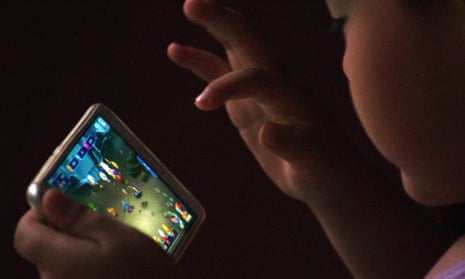All-night gaming marathons will soon end for some Chinese children after the internet giant Tencent began limiting daily playing times on its smartphone smash hit King of Glory in order to “ensure children’s healthy development”.
Young players will be restricted to one or two hours on the mobile online multiplayer battle game, which boasts 80 million daily users, as concerns grow in China that long periods online are posing a serious threat to the country’s youth.
Tencent, which ranks first in the world for gaming revenue, said in a statement that King of Glory was “supposed to bring joy ... but excessive gaming brings joy to neither players nor their parents”.
Some 24 million young people in China are estimated to be internet addicts.
State media reported in April that a 17-year-old gamer in southern Guangdong province suffered a type of stroke after spending 40 consecutive hours playing King of Glory.
The game became the world’s highest grossing game this year, with an estimated first-quarter revenue of around 6 bn yuan ($883m), according to Xinhua state news agency.
Users 12 years of age and younger are now limited to one hour of play a day and will not be permitted to sign in after 9pm, Tencent said on the weekend. The move goes into effect on Tuesday.
Users between 12 and 18 years of age are limited to two hours per day.
According to the company, which called its new controls the “three broad axes,” those who play beyond the allotted time period will be “forced to go offline”.
Tencent will also place caps on the amount of money that underage users can spend on the platform, so as to rein in “minors’ irrational consumption”.
Additional measures implemented earlier this year include a real-name authentication system and software that enables parents to place electronic locks on the game.
China, which became the first country to declare internet addiction a clinical disorder in 2008, introduced draft legislation this February that would ban minors from playing online games between midnight and 8am.
But in the current absence of “clear regulations to guard against mobile gaming addiction,” Tencent said, “we have decided to take the lead ... and dispel parents’ concerns”.
“We also call on parents to spend more time with their children, to allow them to feel more the warmth of growing up.”
In recent years, some Chinese parents began sending their children to intensive internet addiction “rehabilitation” centres known for their military-style tactics.
The draft regulation aimed to curtail the more extreme methods employed at these centres, such as electroshock therapy and beatings.
